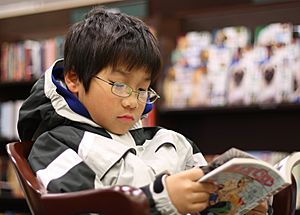Communication facts for kids
Communication is how we share information with others. It's like sending a message from one person (the sender) to another (the recipient) using a special way, called a medium.
We use many different ways to communicate:
- Visual communication: This means using your eyes, like body language or gestures.
- Sound communication: This includes human language, but also sounds like a dog barking.
- Touch communication: Sharing messages through touch.
- Smell communication: Using smells to send messages.
- Writing communication: Sharing thoughts through writing.
Communication can be spoken, like saying a word, or non-spoken, like giving a smile. It happens all the time and in many ways. Not only humans communicate; most other animals do too. Some communication happens without us even thinking, like changing our posture.
When communication tries to change someone's mind, it might be called persuasion or propaganda.
Contents
How Communication Works
Communication works by sending and receiving messages. Here's a simple way to think about it:
- The sender creates a message from an idea. This is called encoding.
- The sender then sends the message using a medium, like talking or writing.
- The recipient gets the message and understands it. This is called decoding.
Besides the message itself, other things are important for good communication:
- Who is talking? What is their role or status?
- Messages usually come with other messages. These are also understood.
For a message to be clear, the sender and receiver need to agree on the words they use. This helps avoid confusion. For example, the word hedge can mean different things. It can be a row of bushes, a way to reduce financial risk, or a word that makes other words less strong. Without more information, it's hard to know what hedge someone means.
What Exactly Is a Message?
A message is a single piece of communication. It can be information, facts, opinions, feelings, stories, news, or ideas. A message can use words (verbal), like an email.
A message can also be non-verbal, meaning it has no words. This includes things like emojis. An emoji can show a facial expression or a hand gesture.
Sometimes, facial expressions and hand gestures are used together, like this emoji:
Non-verbal Communication
Signs and symbols are types of non-verbal communication. For example:
 |
This sign means there's a curvy road ahead. |
 |
This flag symbol means there are scuba divers below. |
Braille is a system of "touch" reading and writing for blind people. Raised dots stand for letters of the alphabet.
Body Language
When people have a conversation, they use many facial expressions and hand gestures. This is called body language.
Hand gestures can mean different things in other countries. To avoid misunderstandings, it's good to know what hand gestures mean before visiting another country or talking to someone from there.
Sign language is used by and with deaf people. It is non-verbal and combines hand gestures, facial expressions, and body movements to show words. It is used along with verbal finger spelling, where different hand gestures represent letters of the alphabet. Some deaf people can also "read the lips" of speaking people.
Communication Through Art
Music and art can share emotional messages. They are also forms of communication.
A song can combine lyrics (words) with a voice or instruments. This can share many feelings.
A comic book can have both words and pictures to tell a story.
Communication Media
The way messages are sent is called the medium. Here are some examples:
| Electronic Medium | Non-Electronic Medium |
|---|---|
| Regular mail letter | |
| Text message | Newspaper |
| Radio broadcast | Book |
| E-Book | A baby cooing on your lap |
| Digital news | Shaking hands |
Related Pages
| Article author: Diane Nelson. Diane taught communication and other subjects in public school for 23 years. She is also a public health nutritionist and taught nutrition at NYU. Diane has traveled widely around the world. She currently teaches ESL part-time. |
See also
 In Spanish: Comunicación para niños
In Spanish: Comunicación para niños






